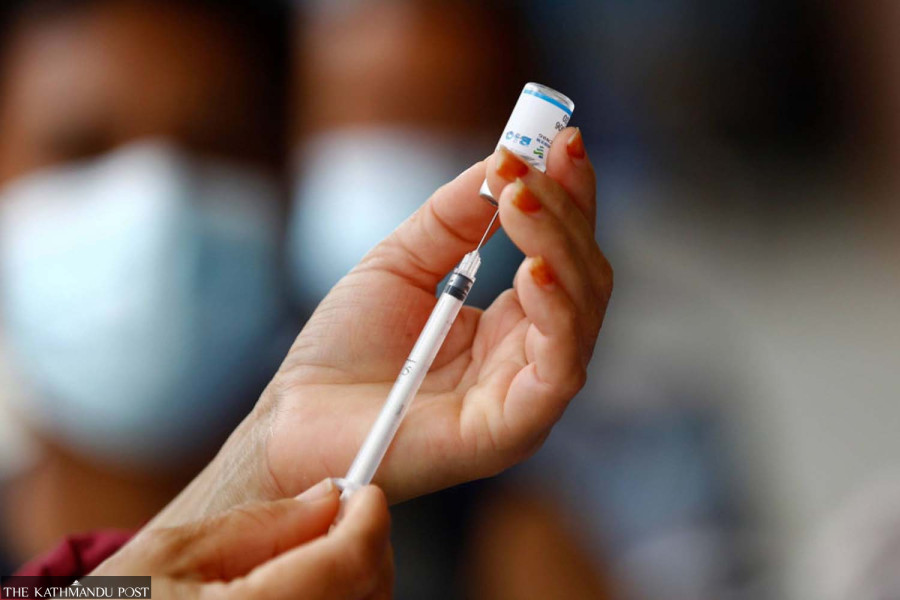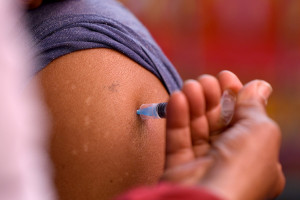Health
Booster campaign for 12–17-year-olds affected due to funds crunch
Vaccination uptake will go down as there won’t be a special campaign this time due to a shortage of budget, say officials.
Arjun Poudel
The Ministry of Health and Population announced booster shots for children and adolescents aged between 12 and 17 years some two weeks ago but most districts throughout the country have yet to start vaccination for the said age group due to budget crunch.
Health workers serving in the districts say they don’t have the budget to launch the booster dose campaign.
“The Health Ministry has not provided us with an additional budget to run such a campaign,” said Krishna Bahadur Mijar, chief of Health Office Bhaktapur. “It is not possible to undertake a campaign without a budget.”
Additional budget is required to provide allowances to health workers and employees involved in launching an awareness drive, say officials.
According to the National Immunisation Advisory Committee’s recommendation, the Health Ministry had decided to provide booster shots to children and adolescents aged between 12 and 17 years who were inoculated with Covid-19 vaccine three months ago.
Basanta Adhikari, chief of Health Office Kathmandu, said his office neither has the time nor the budget to launch a campaign for booster shots for the target group. “Currently, we are working to launch a vaccination campaign for children between five and 11 years old,” he said.
The Health Office Lalitpur said that booster shots will be provided through the regular programme as the authorities concerned have not provided any additional budget for a special campaign.
“It is important to launch a campaign to increase the coverage of the vaccination drive,” said Satish Bista, chief of Health Office Lalitpur. “But it is not our choice.”
The government had provided Pfizer-BioNTech jabs to 12–17-year-olds in 20 districts, including Kathmandu Valley’s three, from November 22 last year.
Moderna vaccines were administered to children in 57 districts from December 20.
Around 3.5 million children and adults of the said age groups were administered Covid jabs from schools.
Experts say that vaccination targets will not be met if jabs are not rolled out as a campaign.
“Coverage of vaccination in 12- to 17-year-olds was high in the primary series of vaccination (first and second doses) since the programme was launched as a campaign,” said Dr Bikash Lamichhane, vice-chancellor at Rapti Academy of Health Sciences who is also the former chief of Child Health Division. “If the programme is not launched as a campaign this time, the coverage will be definitely low.”
Health Ministry officials concede that many districts throughout the country, including those of the Valley, have been unable to launch a booster dose campaign due to budget crunch.
“We have held discussions with officials from several districts and have allocated budget to some,” said Dr Bibek Kumar Lal, director at the Family Welfare Division under the Department of Health Services.
“This time there won’t be a special campaign with specific dates like in the past but the booster shots will be administered through outreach clinics,” Lal added. “We will also deploy mobile vans for vaccination purposes.”
Lal said that his office has requested health offices which are not launching the drive for five to 11-year-olds to run outreach clinics for booster jabs to 12 to 17-year-olds.
Meanwhile, the Health Ministry is preparing to launch a drive in 27 districts to administer vaccines to children between five and 11 years from June 23.
Nepal has so far received 55,584,770 doses of Covid vaccines of various brands—AstraZeneca, Vero Cell, Moderna, Janssen, Sinovac-CoronaVac, and Pfizer-BioNTech—including paediatric doses.
As many as 20,123,223 people or 68.9 percent of the total population have been fully immunised so far.
Nepal started vaccinating its population against Covid-19 on January 27 with 1 million doses of Covishield, the AstraZeneca type vaccine manufactured by the Serum Institute of India, provided in grant by India.
The country needs to vaccinate around 90 percent of its over 29,192,480 population, or over 25 million people, according to the government’s new plan that includes all those above five years old.




 8.85°C Kathmandu
8.85°C Kathmandu















